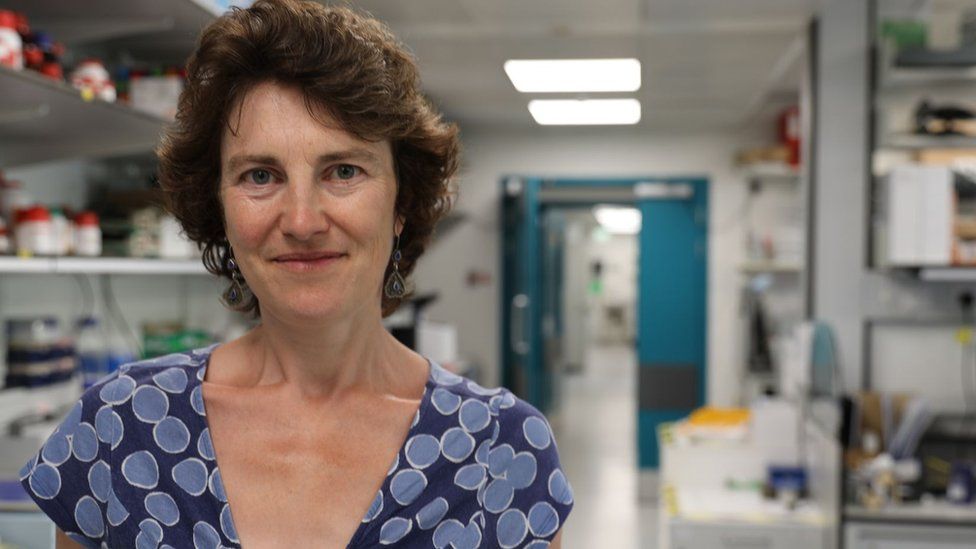ARTICLE AD BOX
 Image source, Lloyd Mann
Image source, Lloyd Mann
Institute director Rebecca Fitzgerald said the outcomes for patients could be transformed by faster detection
The UK's first institute dedicated to detecting and studying cancers at the earliest stage has been launched.
Scientists at the University of Cambridge's Early Cancer Institute (ECI) will focus on hard-to-treat cancers, such as lung and pancreas.
Institute director, Rebecca Fitzgerald, said the research was essential to improve survival rates in patients.
"Outcomes can be transformed if the cancer is diagnosed early enough and we have the right treatments," she said.
The ECI is based at the Cambridge Biomedical Campus, alongside academic, medical and pharmaceutical specialists.
The campus is home to two world-renowned research hospitals, Addenbrooke's and Royal Papworth, as well as the Laboratory of Molecular Biology.
Work could also start next year on the new Cambridge Cancer Research Hospital, meaning that the institute's discoveries and new treatments will be vital to its work.
A dedicated space for the institute in the hospital has also been planned.
Image source, Lloyd Mann
Image caption,Dr Daniel Munoz-Espin (right) is studying the 'micro-environment' around lung tumours and how they could be eliminated
Up to 120 scientists will be based at the ECI, the UK's first physical centre devoted to finding and researching early cancers.
"Most patients are still diagnosed late," Prof Fitzgerald said.
"People have tended to shy away from researching early cancer.
"But unless we do this work we are not going to improve survival rates for the majority of our patients."
The cytosponge can detect changes in the oesophagus and enable tests to be carried out more quickly and easily than endoscopies
What early detection means
Prof Fitzgerald's team is behind the successful "cytosponge" test for Barrett's oesophagus, where patients swallow a pill that dissolves into a sponge.
It is then drawn back up the oesophagus collecting cells from the lining.
Retired anaesthetist Margaret* was diagnosed with the condition - where long-term exposure to stomach acid damages the food pipe.
For the majority of people - around nine in 10 - the condition does not progress further, but for a small number of people it can develop into oesophageal cancer.
Margaret had a clear biopsy, but due to the risks associated with Barrett's oesophagus, was told to have check-ups every three years.
However, Covid meant that NHS resources were diverted, and she was never contacted in 2021.
"I got a call in February [this year] to say that I would have to wait longer for an endoscopy, but that they could offer me this new sponge test," said Margaret.
The test showed early evidence of dysplasia, a pre-cancerous stage.
Only one in eight oesophageal cancer patients (12%) survive for 10 or more years.
For Margaret, the cytosponge test detected her condition in time for it to be treated and her specialist removed the pre-cancerous tissue.
She now has three-monthly check-ups and has been told that if the dysplasia doesn't return, it may be possible to "burn off" the Barrett's oesophagus tissue.
Image source, Lloyd Mann
Image caption,The Early Cancer Institute is based in the University of Cambridge's Hutchison Building on the city's Biomedical Campus
Prof Fitzgerald said it was important for the centre to be based in Cambridge, which she said had "a rich history of making huge strides in cancer research".
"We want to build on this legacy of discovery and innovation and apply it to early cancer."
Prof Fitzgerald said the campus was one of only four places in the world dedicated to life sciences - and the biggest in Europe.
A £20m fundraising campaign to upgrade the institute's facilities in the Hutchison Building and recruit more newly qualified researchers has also begun.
"We're working to move the world beyond the fear of cancer," said Prof Fitzgerald.
Find BBC News: East of England on Facebook, Instagram and Twitter. If you have a story suggestion email eastofenglandnews@bbc.co.uk
Related Internet Links
The BBC is not responsible for the content of external sites.

 2 years ago
39
2 years ago
39








 English (US) ·
English (US) ·